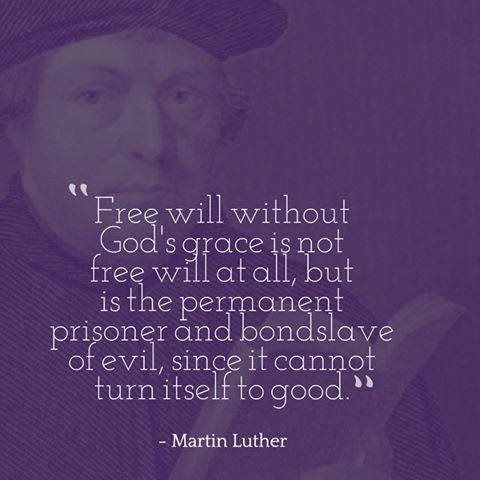 Recently, I received a comment from someone who suggested that we should still teach "free will" because it practically helps encourage people to behave ethically. This was the statement:
Recently, I received a comment from someone who suggested that we should still teach "free will" because it practically helps encourage people to behave ethically. This was the statement:
The belief that one can choose to do good freely... significantly impacts upon the idea that the Golden Rule is worthy of practice ... and will significantly help to lead one to behave accordingly.... and to encourage treatment of others with the dignity of self-determination. It is better to promote the idea of free will ... the belief is important. Hopefully, whatever one defines as "good" is in agreement.
How do we respond to this? The truth is, freedom entirely depends on which side of grace we are on. There is no biblical concept of free will before grace. Better to be as biblical as we can and explain freedom the way Jesus does: "whoever practices sin is a slave to sin ... [but] if the Son sets you free you will be free indeed." (John 8:34, 36) To teach that the natural man has a free will, therefore, is to overthrow the gospel. That our will and affections were in bondage to sin (as natural men) is precisely why we needed the gospel in the first place. But now that we have been set free by Christ, we are free to obey and live according to the principles like the golden rule that the comment mentions.
When we give God's commands to an unbeliever, however, it is not because he is able to obey them. Paul rather says the purpose of divine commands is to reveal sin (Rom. 3:19) - and when men and women despair of themselves then they are in a perfect position to receive grace.
When someone claims that fallen people have a free will, my usual response is to ask, "Freedom from what?" Freedom from bondage to sin? Freedom from God's decree? No to both. I think perhaps what many people mean by "freedom" is that our choices are voluntary, not coerced. And in this we would agree. Post-fall/Pre-Regeneration we make voluntary choices but the condition of such persons are that they in bondage to sin -- who "love darkness and hate the light" (John 3:19). Since the natural man is captive to the flesh, of necessity, they must choose evil. But very imporatntly we must remember that he voluntarily chooses evil ... he is not making the choice against his will - this is what he wants. God is not coercing him. So their desire is always to flee from the true God unless Christ frees them by granting them new eyes to see, new ears to hear and a new heart to believe (Ezek 36:26, John 6:63)
-------
Quotes
The only "free-will" natural man has is willful blindness (Deut 29:4, Rom 3:11-20; John 3:19), so it is not "free-will" that we need but mercy ... mercy to disarm and deliver us from our inflexible, obstinate, fortified self-will and its captivity to sin and the Devil. (John 8:34-36, 2 Tim. 2:26; Rom. 9:16). So-called "free-will" is the problem, not the solution. - John Hendryx
If the natural man has a free will to believe the gospel, then why does he need grace? If his will is naturally free then it would do away with the need for grace altogether. Therefore to teach that the natural man has a free will overthrows the gospel ... it is precisely because man is in bondage that he needs Christ to set him free." (John 8:34, 36) - John Hendryx
"Free will I have often heard of, but I have never seen it. I have always met with will, and plenty of it, but it has either been led captive by sin or held in the blessed bonds of grace." - C. H. Spurgeon
"...we allow that man has choice and that it is self-determined, so that if he does anything evil, it should be imputed to him and to his own voluntary choosing. We do away with coercion and force, because this contradicts the nature of the will and cannot coexist with it. We deny that choice is free, because through man's innate wickedness it is of necessity driven to what is evil and cannot seek anything but evil. And from this it is possible to deduce what a great difference there is between necessity and coercion. For we do not say that man is dragged unwillingly into sinning, but that because his will is corrupt he is held captive under the yoke of sin and therefore of necessity will in an evil way. For where there is bondage, there is necessity. But it makes a great difference whether the bondage is voluntary or coerced. We locate the necessity to sin precisely in corruption of the will, from which follows that it is self-determined. - John Calvin from Bondage and Liberation of the Will, pg. 69-70
